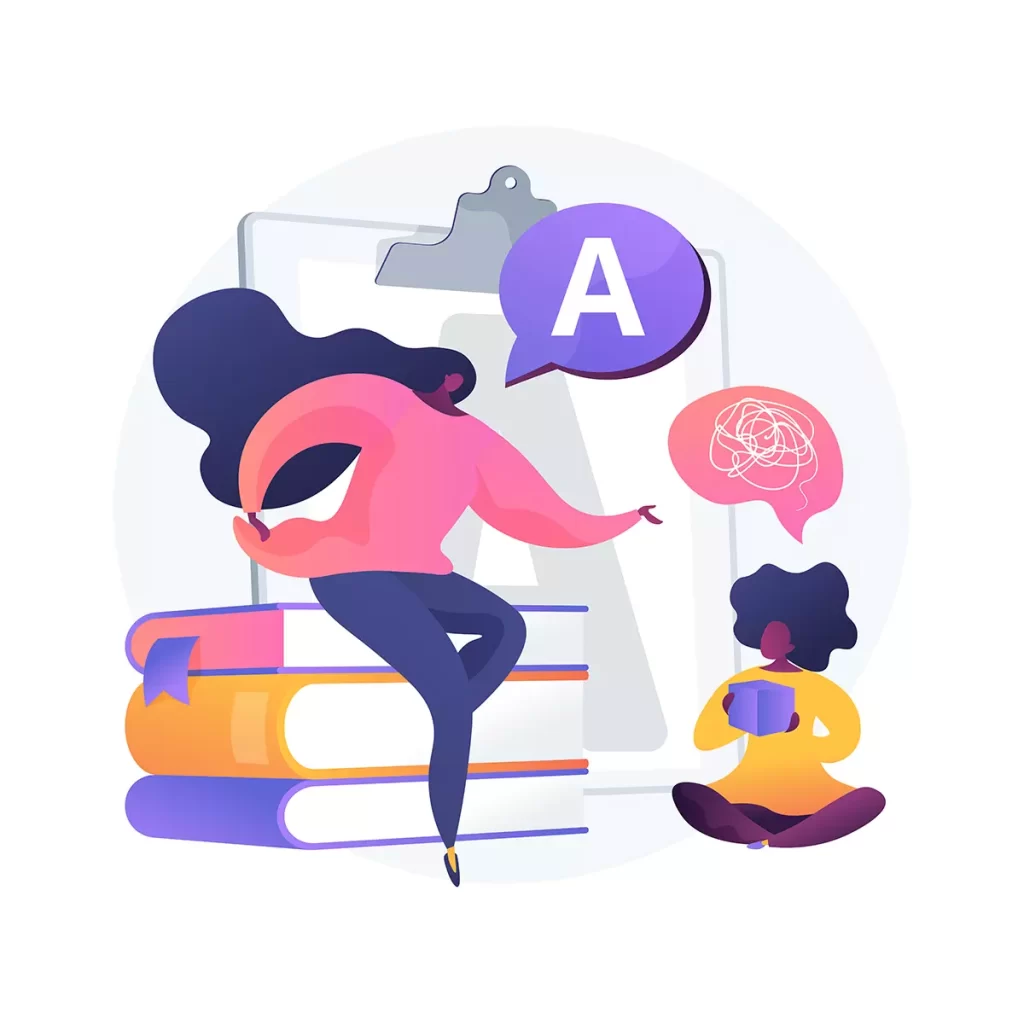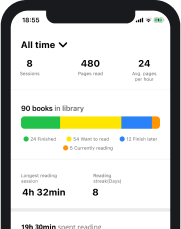As passionate readers, we are constantly looking for ways to improve our performance and the overall experience. Whether that means improving reading skills, finding better locations for our reading sessions, or simply making better choices when it comes to the books we read, our pursuit of extracting maximum value from our sessions is never-ending.
Here at Basmo, we know full well what it means to constantly try to improve the reading experience and our main goal is to support you achieve your reading-related dreams. That being said, let’s make sure you have a good understanding of what reading skills are, why they matter, and how you can improve them.
What Are Reading Skills?
The reading skills definition states that the term describes one’s complete set of abilities and strategies used to decode and understand written text. Reading skills are a broad term that actually incorporates a multitude of different cognitive processes.
While in certain contexts having reading skills simply means having the ability to decode written language and understand its meaning, the true meaning of skills in reading is a lot deeper than that.
Reading is a very complex activity and it encompasses a huge variety of different skills and mental abilities. From visual processing, decoding, vocabulary recognition, and phonemic awareness, to information retention, reasoning, and making connections between newly acquired data and background knowledge, there are many areas of reading people can actually develop and improve their skills in.
Developing reading skills and improving reading skills are two different journeys, equally important for a reader’s experience and efficiency. Don’t worry, everything you need to know will be covered below.
What Types of Reading Skills Are There?
As I mentioned above, having good reading skills means a lot more than just knowing how to read. There are many components to being a reader and a lot of moving parts in being an actually good or efficient reader. Let’s go over some of the most important reading skills you should possess and attempt to improve in order to become the ultimate reader.
1. Phonics
The very first and most fundamental reading skill you need to possess is represented by phonics. This term describes one’s ability to understand how letters and sounds are linked together. Understanding phonics and their role in the process of reading means basically understanding how letters translate into sounds.
Learning the sounds each letter represents is the first step in learning to read and that is why phonics is an absolutely essential building block when it comes to reading skills. Through this, people who learn to read begin their journey toward decoding and comprehending written text.
2. Decoding
Decoding is defined as another fundamental reading skill, one of the main building blocks on which all other skills rely. It involves actually translating the written language into spoken language by decrypting the symbols, understanding the way letters form words, the way words form sentences, and extracting the meaning of the written text.
It relies on understanding the relationship between letters and sounds to a certain extent and using the visual aspects of the written text in the process of extracting the meaning and transforming it into usable information.
Decoding skills are therefore absolutely essential for understanding written text, developing fluency, and building vocabulary. Acquiring the proper decoding skill usually takes quite some time and it is a constantly improving process over the course of a couple of years.
3. Vocabulary
One’s vocabulary is defined as the set of words a person is familiar with, understands, and is able to use correctly. As readers, we constantly strive to improve and enrich our vocabulary precisely because it is a very important reading skill.
Vocabulary is a fundamental tool in one’s life, essential in communication and the process of acquiring knowledge. For readers, the relevance of a rich vocabulary is pretty obvious: the more words you are familiar with, the easier it is for you to go through written content with a good degree of fluency.
4. Fluency
Speaking about fluency, this is yet another absolutely essential reading skill you should know about and constantly work on improving.
By its definition, fluency is a reading skill that involves the ability to read smoothly and accurately with adequate speed and expression. A fluent reader will use the correct intonation, and will not stumble over complicated or unfamiliar words.
One important thing to remember about fluency is that while the obvious meaning that is attributed to the term refers to the actual way a person reads aloud, fluency also matters during silent reading. Fluency is critical for successful reading comprehension because it allows readers to concentrate on understanding the meaning of the text rather than decoding individual words.
It also helps to develop higher-level reading skills like analysis, evaluation, and interpretation by freeing up cognitive resources for these tasks. As a result, it is an important component of reading proficiency and academic success.
5. Sentence Construction & Cohesion
Understanding sentence construction and cohesion is an essential reading skill. It involves the reader’s ability to correctly use grammar and understand its role in building sentences and to connect ideas through these sentences.
While sentence construction is generally seen as a critical skill for writing, it is equally important to be able to reverse-engineer sentences in the sense of extracting meaning from them and understanding the message conveyed through them. Sentence construction is a reading skill as well as a writing skill and it involves a good understanding of punctuation, rules of syntax, subject-verb agreement, and sentence structure.
Cohesion, while equally important, refers to using language features effectively. That means understanding conjunctions, transitional words, pronouns, and their roles in connecting ideas and transmitting clear messages through sentences.
Reading proficiency is impossible without effective sentence construction and cohesion skills because they are essential tools in helping readers understand text structure and meaning.
6. Reading Comprehension
Through reading comprehension, we understand one’s ability to extract valuable information from a written text and to find the meaning in the sentences and paragraphs of the reading material. This is one of the most essential reading skills and it encompasses lots of other equally important elements such as decoding, vocabulary, inferential thinking, and sentence structure.
As you can imagine, the importance of reading comprehension cannot be underestimated. Without it, academic and professional success are very unlikely. One’s inability to understand the information and its meaning can affect their ability to process data, to think critically, and to analyze information accurately to make informed decisions.
The good news is that practice can improve reading comprehension skills both through fiction and non-fiction reading.
7. Reasoning & Background Knowledge
Once the information you read about is properly comprehended, it is time to put it to good use. While for the most part that involves basic memorization and the ability to retain the data, there are some more complex processes involved as well.
Properly using newly acquired information means being able to use it as part of a reasoning process and creating links and connections to already existing background knowledge. Through reasoning, we refer to actually being able to think logically and draw certain conclusions from the information we read.
Using background knowledge to make connections while reading is absolutely necessary in order to be able to put things in context and to mentally develop properly. This can lead to a better understanding of certain topics, and even better information retention.
8. Working Memory & Attention
Perhaps overlooked to a certain extent, when it comes to the skills of reading, a properly working memory and the ability to pay attention and concentrate on the task at hand are of utmost importance.
Memorizing what we read or retaining the information we acquire is absolutely essential. It helps us uncover the meaning of what we read, it gives us the chance to store and later use the information we learn and plays an important role in actually understanding a book from start to finish.
Being able to pay attention while reading and actually retaining the important information you are reading about is definitely an important skill to have and it can provide you with a great reading experience and better overall performance both academically and professionally.
What Are the Most Common Reading Problems?
Most of us don’t put much thought into this, but there are quite a lot of reading problems people have to face on a daily basis. While many of us are constantly trying to find ways to improve reading skills, there are certain people who are struggling with much more pressing reading problems. Identifying and finding solutions for the most common reading problems can help you become a more proficient and accomplished reader. Here at Basmo, we want you to have all the tools you need in order to achieve your goals, so here is a list of the most common reading problems.
1. Poor comprehension skills
Even though I already mentioned in the reading skills list above how important comprehension is in reading, it is essential to explore how damaging poor comprehension levels can be both in terms of performance and experience.
Having sub-par comprehension skills is no laughing matter and can seriously hinder academic and professional success. The good news however is that comprehension can be improved through practice. The more you read, the more you train your brain, improving the level at which it processes information.
2. Decoding issues
Especially common for beginner readers, decoding issues can be a serious stepping stone for those who want to achieve reading proficiency. They are usually a result of a lack of proper instruction in the process of learning to read or inadequate practice.
Decoding issues can hinder reading speed and comprehension and result in a poor relationship with reading in general. A person who is unable to properly decode while reading will usually have trouble linking words to the sounds they represent, will have a hard time recognizing words out of context, and will be unable to properly identify the right way to express while reading.
3. ADHD
ADHD stands for attention deficit hyperactivity disorder and is one of the most common neurodevelopmental disorders. It is especially common in children, but it affects adults as well. While it is mainly characterized by an inability to pay attention, it comes with some other symptoms as well: a predisposition to be easily distracted, being overly active, or being unable to control impulsive behaviors.
As you can imagine, reading with ADHD is a challenge. For those affected by this condition, it is extremely difficult to focus on one task at a time and not be distracted. Since reading is an activity that requires concentration for extended periods of time, it is easy to see how ADHD can hinder performance.
4. Dyslexia
Affecting phonological awareness, verbal memory, and processing speed, dyslexia is a rather common learning difficulty that has a devastating effect on a person’s ability to read and write accurately.
Spelling correctly is extremely difficult for people affected by dyslexia and the same is true when it comes to reading. They generally have a hard time differentiating between letters, especially those that look somewhat similar to each other.
How to Improve My Reading Skills?
Because we want you to be able to achieve your top potential, we compiled a list of tips to improve reading skills that are certainly going to give your performance a massive boost. By improving your reading skills, you will be able to read more, quicker, and with better retention and comprehension levels.
What Is the Most Important Factor in Improving Reading Skills?
While there are many things to factor in when it comes to improving reading skills, the one that always seems to stand out is consistency. The more you practice, the better you will become.
Reading is an activity where your performance is directly linked to the frequency at which you practice. In other words, your performance will constantly improve as long as you are consistent and you practice regularly. The more you read, the better reader you will become.
7 Ways Reading Skills Can Be Improved
Since we explored the importance of finding ways to improve reading skills extensively, it is now time to present you with a couple of the most common and useful options. Use these tips to improve reading skills and achieve your goals.
Read regularly – as mentioned above, consistency is of utmost importance when it comes to improving reading skills. Make reading a daily habit, never skip your reading sessions, and always have a book on hand. This will help you tremendously with improving your skills.
Read widely – don’t get stuck within a genre or reading all the books from the same author. By reading various books from different genres you will expose yourself to more information and more ways of presenting the information. That way, your general knowledge will be improved, as well as your reading skills and the ability to comprehend and retain data.
Improve vocabulary – a better vocabulary is an amazing way to improve your reading skills. The process comes with a snowball effect: the better your vocabulary, the better you will become at reading, which in turn will enrich your vocabulary even further. The more you read, the more you learn. The more you learn, the better your reading skills will become.
Read actively – engaging in active reading sessions will make you more aware of your reading level and will constantly push you to improve. Active reading is a mentally challenging activity and one that you should always take advantage of. It is a great way to exercise your brain and improve your reading skills.
Summarize – as simple as it may sound, summarizing can work wonders for your reading performance. Summarizing involves synthesizing all the information you go through while reading and extracting the key data points that you will need to remember. By constantly doing this after reading, you will improve your analytical skills and your logical thinking.
Read aloud – reading out loud will shed some light on your current reading level. You will get to hear yourself, you will notice any inconsistencies in your expression and flow, and you will have a clear starting point for improving your reading skills. Also, sounding out the words you read has a positive effect on comprehension levels.
Read with a purpose – in order to really improve your reading skills, your motivation is extremely important. Always know why you are reading, keep the thought of improving your skills in the back of your mind at all times, and read with a clear purpose.
How Can Basmo Help
Improving reading skills is a tough thing to go through. There are many aspects that you need to consider and quite a lot of different things to work on. Luckily for you, there are ways you can make the whole process easier and Basmo is at the top of the list. Basmo is a reading tracking app designed for modern readers and their particular needs.
Here’s how it can help you improve your reading skills.
Schedule your reading sessions: as I mentioned, consistency is key. With Basmo, you can set a clear schedule for your reading sessions. Choose the days of the week and different times for each day and the app will even remind you of any upcoming reading sessions.
Set goals for your reading: reading with a purpose is the only way you can stay motivated to constantly improve. That being said, Basmo offers you the possibility to set clear goals for your reading. Whether you want to set a goal for the number of minutes you read on a daily basis or a big-picture goal for the number of books you read within a year, Basmo has got you covered.
Read actively like never before: active reading requires diligent annotating, note-taking, and a structured approach to reading. With Basmo, all of this can be done easily thanks to the note-taking and annotation features.
Final Thoughts
Improving your reading skills may seem like a great ordeal, but thanks to our tips and with the help you can get with the Basmo app, there is nothing that can stop you from becoming the ultimate reader.
Image by vectorjuice on Freepik







